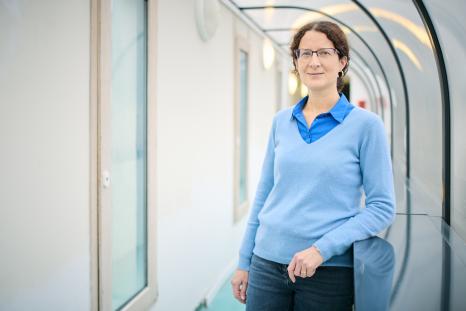
Muriel Boulakia: mathematics applied to the biomedical field
Muriel Boulakia is a University Professor and Lecturer at the Mathematics Laboratory of Versailles (LMV - Univ. Paris-Saclay, Univ. Versailles Saint-Quentin-en-Yvelines UVSQ, National Centre for Scientific Research CNRS). From analysing fluid-structure interaction problems to numerical methods for inverse problems, her work is applied to the biomedical and pharmacological sectors, which are her preferred fields.
Muriel Boulakia obtained her master's degree in mathematics from the Université de Versailles - Saint-Quentin-en-Yvelines (UVSQ) in 1999. She then joined the École Normale Supérieure de Cachan (now ENS Rennes) in Brittany, after successfully passing the competitive exam in her third year. In 2000, she passed her teaching qualification (agrégation) in mathematics, then specialised in numerical analysis and partial differential equations, completing a Diploma of Advanced Studies (DEA) (equivalent to a 2nd year Master's degree in research) in this field at the University of Paris VI (now Sorbonne University).
Deciphering partial differential equations
From 2001 to 2004, Muriel Boulakia conducted a thesis in mathematics at the Laboratory of Applied Mathematics of UVSQ. Her thesis focused on fluid-structure interaction problems, i.e. all mechanical situations where a fluid interacts with a solid structure, such as when elastic particles move in a fluid. She was particularly interested in their theoretical aspect, studying the partial differential equations that model them. Her goal was to understand the nature and long-term behaviour of the solutions to these equations, including their regularity, as long as contact situations are avoided. "The study of these equations modelling fluid-structure interaction is a field with many open problems, offering a variety of models to examine and presenting multiple, unresolved scientific questions."
A confirmed interest in biomedical applications
Muriel Boulakia harbours a strong interest in biomedical applications, and mathematics has led her to explore this field. "My thesis subject, although theoretical, led me down this path because it was about the practical application of studying blood flow in veins. This enduring interest still drives me today." In 2005, the lecturer continued this trajectory, joining the National Institute for Research in Digital Science and Technology (Inria) Paris for a post-doctoral position in the REO (Mathematical modelling and Numerical Simulation of Biological Flows) project team (now known as COMMEDIA or Computational mathematics for bio-medical applications). There, she tackled new issues, getting involved in a newly-created project on cardiac electrophysiology. She deepened her expertise in modelling and numerical simulations, working on realistic 3D geometric models to reproduce electrocardiogram measurements. In 2006, she joined the Jacques-Louis Lions Laboratory (LJLL) at Sorbonne University as a lecturer, while remaining associated with the Inria Paris project team. In 2015, Muriel Boulakia successfully presented her Accreditation to Supervise Research at the LJLL. Then, in 2021, she took up a professorship at the Mathematics Laboratory of Versailles (LMV) at UVSQ.
The specificity of inverse problems
Continuing her work, since 2005, Muriel Boulakia has been dedicated to analysing the numerical methods used for inverse problems, a field that echoes that of controllability, with similar techniques. Based on observations and measurements, it involves recreating the information about the system modelling the phenomena. In the medical field, this approach makes it possible to diagnose from data (such as those from an electrocardiogram), by identifying a specific parameter indicating a pathology. Thus, by understanding the reasons why approaches fail in certain cases, it becomes possible to improve the numerical methods implemented.
Pharmacology and statistical learning
In 2015, Muriel Boulakia broadened her research by delving into pharmacology and statistical learning. She focused particularly on the study of the electrical behaviour of cardiac cells in the presence of drugs. Determining in this way how these cells react to different substances is crucial in pre-marketing drug testing. "This research is of great importance and is helping to reduce the need for animal testing, which aligns with contemporary ethical standards." As part of these pharmacological studies, Muriel Boulakia is working closely with Notocord, a company specialising in the development of medical measurement processing software.
She also incorporates the use of Big Data into her research, which provides access to a substantial volume of measurements. She combines traditional methods of analysing partial differential equation and optimisation with statistical learning techniques to take advantage of this abundance of data. "This new approach marks a turning point in the way biomedical data are analysed and used for the development of new therapies and drugs."
A rich career in teaching and educational leadership
Alongside her research work, Muriel Boulakia taught at Sorbonne University from 2006 to 2020. Her expertise also benefited engineering students in their first and second years at Polytech Sorbonne. Between 2012 and 2021, she helped to prepare students for the teaching qualification (agrégation) in mathematics at the Université Pierre-et-Marie-Curie, especially for the oral exam in the scientific computing option. From 2014 to 2018, as Head of Mathematics Teaching at Polytech Sorbonne, she organised mathematics courses tailored to various fields of study, from agri-food to earth sciences, as well as mechanical engineering and electronics. She was responsible for the distribution of the courses, programme development and the recruitment of new academic staff.
Deputy Director of the mathematics department
In 2023, Muriel Boulakia took up this educational role as Deputy Director of the LMV's mathematics department. She coordinates the distribution of teaching staff, finds competent temporary lecturers and manages assignments for temporary positions. "What's more, given the growing diversity of student profiles, I'm committed to guiding them towards success. Mathematics opens the door to a wide variety of careers, some of which are often unknown. A thorough education in mathematics provides a wealth of knowledge and skills in precision and reasoning that are useful in all scientific careers." Finally, Muriel Boulakia is also involved in doctoral supervision, leading ambitious projects and supporting PhD candidates, young researchers and post-doctoral fellows.

